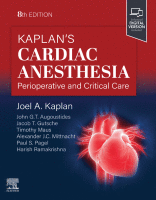Physical Address
304 North Cardinal St.
Dorchester Center, MA 02124

Key Points 1. Cardiac surgical patients who require intensive care represent a particular population whose outcomes are dependent on decision-making throughout the perioperative period. 2. Cardiac surgery patients are susceptible to acute kidney injury (AKI) from a variety of mechanisms…

Key Points 1. The care of heart and lung transplant patients requires a multidisciplinary approach by a team dedicated to collaborating to provide the best care. 2. Inotropic therapy is often required for patients undergoing heart or lung transplantation with…

Key Points 1. Intra-aortic balloon pump counterpulsation increases coronary artery perfusion pressure, increases coronary artery blood flow (particularly in cardiogenic shock), and augments cardiac output by approximately 5% to 15%. 2. Catheter-mounted ventricular assist devices (VADs) are available for isolated…

Key Points 1. Maintaining oxygen transport and oxygen delivery appropriately to meet the tissue metabolic needs is the goal of postoperative circulatory control. 2. Cardiac function worsens after cardiac surgery. Therapeutic approaches to reversing this dysfunction, including pharmacologic and mechanical…

Key Points 1. Pulmonary complications following cardiopulmonary bypass (CPB) are relatively common with up to 12% of patients experiencing some degree of acute lung injury and approximately 1% requiring tracheostomy for long-term ventilation. 2. Patients with preexisting chronic obstructive lung…

Key Points 1. Point-of-care ultrasound performed in the critical care setting is a valuable tool for augmenting traditional methods of clinical evaluation. 2. Key components of this examination include portable ultrasound imaging with “real-time” interpretation at the bedside in a…

Key Points 1. Despite a progressive decrease in cardiac surgical mortality, the incidence of postoperative neurologic complications has remained relatively unchanged over the decades. During this same interval, the age and the extent of comorbidities in cardiac surgical patients have…

Key Points 1. Inadequate postoperative analgesia and/or an uninhibited perioperative surgical stress response has the potential to initiate pathophysiologic changes in all major organ systems, including the cardiovascular, pulmonary, gastrointestinal, renal, endocrine, immunologic, and/or central nervous systems, all of which…

Key Points 1. Enhanced recovery is a multidisciplinary approach to quality improvement that spans all phases of surgical care. 2. The patient’s experience, health-related outcomes, and functional recovery are optimized through the standardized application of perioperative care bundles consisting of…

Key Points 1. Clinical hemostasis reflects an integrated interplay between the coagulation system, the fibrinolytic system, platelets, and the vascular endothelium. 2. The coagulation cascade has four main components, namely the contact activation, the extrinsic, the intrinsic, and the common…